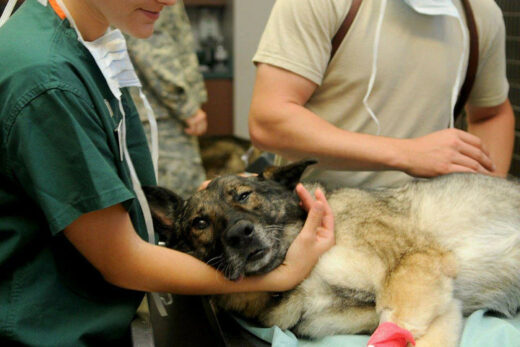
When our dogs reach old age or the tail end of a terminal disease, it can be tough to know precisely when the time is coming. We hope this guide can help you through this stressful time with information on what the end days may look like and how to help your dog until its peaceful end.
The Difference Between Illness and Death
Though we often know our dog is dying, it’s still a sad and often stressful situation as they can’t tell us exactly how they’re feeling.
But how do you know if your doggo is just ill or showing signs a dog is dying of cancer or old age? If your dog is acting strangely, make an appointment to get them examined by a vet ASAP.
A vet will give you a proper diagnosis and tell you if your dog is truly in its end stages of life or still has some time left to enjoy with you.
For those dogs that get sent home with a terminal illness or the inevitable body shutdown from old age, you’ll want to keep a close watch on your dog for signs they’re nearing death and may need some help.
Senior Dogs: Signs Your Dog is Dying of Old Age
Whether human, dog or other living creature, old age is an inevitable part of life. If your dog is in its later senior years and nearing its end, it can be helpful to frame the loss of a dog as a success rather than a trauma – your dog was fortunate enough to outlast illness or disease and is now its life is coming to a natural end.
Unfortunately, not as long as us. Most dogs live 10 to 13 years on average, though it varies from breed to breed.
You’ll notice plenty of behavioral changes as your dog ages, and while they don’t all mean death is near, a few symptoms may be your dog giving you signs their body is shutting down. We can see these all in younger dogs who may be in the end stages of a terminal illness.
#1: Restlessness & Agitation
You may notice your dog becoming uncomfortably restless and unable to sit still. Beyond the pacing, a dog’s mood may seem agitated due to pain or general discomfort within their bodies.
Restlessness may also come from a senior dog’s cognitive and behavioral changes – some develop canine dementia or Canine Cognitive Dysfunction.
If your dog is nearing its end and experiencing these issues, a vet may recommend supplements or medications to help keep them relaxed.
#2: Difficulty Breathing
Labored breathing can be a sign of plenty of health issues, both minor and severe. If you notice your dog breathing heavy, extending its neck out, and gasping for air, you’ll need to call the vet immediately. A dog breathing hard can mean imminent death, and a vet may be able to save your dog or help you decide to end their suffering.
Elderly dogs may have minor breathing issues as they age, making it difficult for them to lie down and walk long distances. If your dog is nearing their end, make breathing a more manageable task by keeping the food and water bowls close to minimize its need to walk. You can also get a bed ramp for dogs to allow them on and off your furniture without the need for assistance.
#3: Refusing to Eat
If you notice your sweet dog not eating, it’s a significant cause for concern – most dogs live for dinner time. Once your dog starts eating less, it may be a sign that something is seriously wrong in its body, or it’s beginning to shut down naturally.
Unfortunately, eating less may cause your dog to lose weight, including crucial muscle mass that can keep their strength up. You can encourage your doggo to eat more up until the end by offering some of their favorite human food. If they’re having digestive issues, simple cooked chicken and rice should keep their discomfort at bay.
Vets may prescribe your dog appetite stimulants to encourage them to eat more. Does the dog die? If your dog hasn’t eaten for three or more days for no medical reason, its body may be naturally shutting down from old age.
#4: Refusal to Drink
Some dogs may stop eating, stop drinking, or even both. A dog stops drinking because it doesn’t have the energy to or feels sick to its stomach.
A dog refusing to drink for longer than three days may suffer from fatal kidney damage, so take your dog to a vet ASAP if you notice this behavior change.
Keep fresh water close to encourage more drinking and offer them water by holding a bowl to their face regularly – they may be more likely to accept a drink from you than seek it out on their own. You can feed your dog wet canned food instead of dry kibble to sneak in a bit more water.





